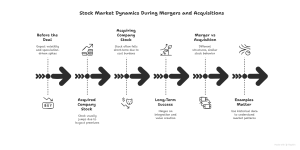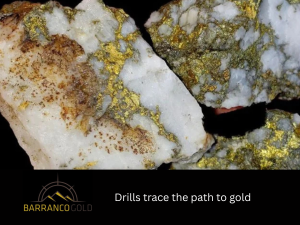On This Page
Table of Contents
When two companies shake hands on a major acquisition deal, it’s not just boardrooms that buzz—stock markets do too. Investors rush to interpret the potential outcomes, leading to dramatic swings in share prices. But why does the acquiring company’s stock often fall while the acquired company’s stock climbs? What happens before the deal is even confirmed? And how does a merger compare to an acquisition when it comes to share price reactions?
Let’s break down all these dynamics so you can understand exactly how stocks behave during a corporate buyout.
What Happens to the Acquired Company’s Stock?
When a company becomes the target of an acquisition, its shareholders often hit a windfall. That’s because the acquiring company usually offers a premium—an amount above the current market price—to make the deal attractive.
Why the Premium?
- The acquiring company wants to persuade shareholders to sell.
- Premiums reflect the perceived value and future synergies the acquirer hopes to gain.
- Deals can come as a tender offer—a public proposal to buy shares at a premium price—or through direct negotiations.
Once news breaks, the target company’s stock price typically shoots up, aligning closely with the offered buyout price.
Example:
If a company’s shares are trading at $50 and it receives a buyout offer at $65, you can bet that the market will push the stock price up to somewhere near that $65 mark—sometimes even higher if there’s speculation of a bidding war.
What About Delisting?
After an acquisition closes:
- The target company may be delisted from stock exchanges.
- Shareholders either get cash payouts or shares in the acquiring company, depending on the terms.
- Ownership officially transfers, and the target ceases to be an independent entity.
What Happens to the Acquiring Company’s Stock?
Now here’s the plot twist: while the acquired company celebrates, the acquirer’s stock often takes a dip. That might seem backward, but here’s why:
Cost Burden & Risk
- The acquiring firm usually pays a hefty premium.
- It might take on debt or issue new shares, triggering capital dilution.
- Investors may worry the acquirer is overpaying, especially if the target has shaky finances.
For investors wondering whether an acquisition target is worth the risk, learning to assess undervalued opportunities can offer a real edge.
Short-Term Drop, Long-Term Hope?
Although a short-term drop in stock price is common, if the integration goes smoothly, the acquiring company may recover and thrive thanks to:
- Increased market share
- Operational synergies
- Access to new products or customer bases
Pre-Acquisition Volatility: The Calm Before the Storm?
Here’s where things get juicy. Stock prices often start moving before any official announcement.
Insider Whispers and Market Speculation
- Rumors, leaks, or strategic positioning spark buying frenzies.
- Increased trading volume and stock spikes are common.
- Regulatory bodies like the SEC closely watch for insider trading.
This phenomenon, often referred to as “pre-deal price action,” creates risk and opportunity:
- Investors betting on a takeover might win big—or lose fast if the rumor fizzles.
Example: If there’s buzz that TechCo might acquire StartupX, traders may start piling into StartupX’s stock, driving up the price before any formal word comes out.
Mergers vs. Acquisitions: Are They the Same?
Nope—they’re not the same, even if they have similar outcomes.
| Merger | Acquisition |
| Two companies of similar size combine | One company takes over another |
| Usually creates a new entity | Target company gets absorbed |
| Typically stock-for-stock deals | Often cash buyouts |
| Seen as a partnership | More of a takeover (friendly or hostile) |
From a stock behavior standpoint, the patterns are pretty similar:
- The target company’s stock rises on announcement.
- The acquirer’s stock dips, temporarily.
Historical Examples of Stock Movement in Acquisitions
Let’s look at a few real-world M&A stories to see how stocks behaved:
- Microsoft’s Acquisition of Activision Blizzard (2022–2023)
- Activision stock jumped by ~27% after the deal was announced.
- Microsoft’s stock remained steady, with minor dips due to regulatory scrutiny.
- Disney’s Purchase of 21st Century Fox (2019)
- Fox shares surged on news of the $71 billion offer.
- Disney’s stock initially fell, reflecting cost concerns and integration risks.
- Long term? Disney gained valuable IP like Marvel rights and Hulu stake.
- Apple Buying Beats (2014)
- Beats wasn’t public, but speculation caused buzz around Apple’s stock.
- Investors debated whether Apple needed Beats, but the stock stabilized quickly, and the move strengthened Apple’s music business.
Summary & Key Takeaways
So, let’s bring it all together:

Whether you’re an active investor or just M&A-curious, knowing the typical stock reaction during acquisition gives you a solid edge in understanding market dynamics.
Frequently Asked Questions
Q: What happens to my shares if the company I own gets acquired?
A: You’ll either receive cash for your shares or new shares in the acquiring company, depending on the deal terms.
Q: Why does the acquiring company’s stock price drop after an acquisition?
A: Usually due to costs, debt, and uncertainty about integrating the acquired company.
Q: Can I make money from acquisition rumors?
A: You could—but it’s risky. If the deal falls through, the stock could tank fast.
Q: Are mergers safer for stockholders than acquisitions?
A: Not necessarily. Both carry risks and rewards, depending on how the deal is structured and managed.



